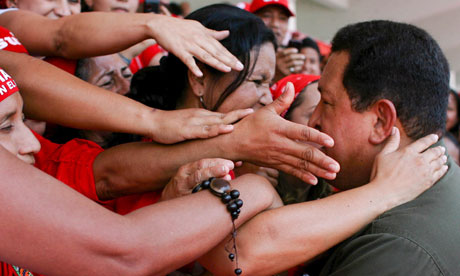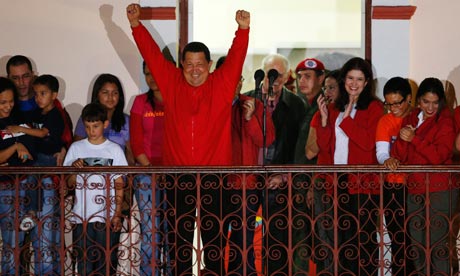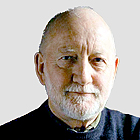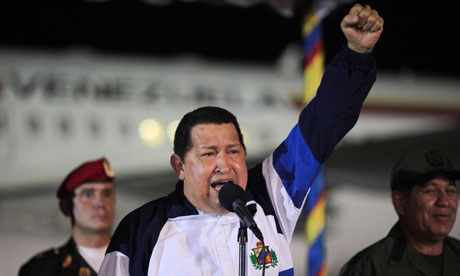When I was a history student, I always wished I could hear one of the great orators of our time, a man or a woman who could sway a crowd and change the course of events with the power of their rhetoric. So I felt lucky to see Hugo Chavez, the revolutionary president of Venezuela, speak many times in Caracas.
What immediately struck you was his wit. His speeches were full of jokes and laughter, often misunderstood and misinterpreted by the foreign, particularly the American, media. He picked people out from the crowd, asking about their families or home towns, recalling a titbit of history about the place. He could switch from homespun banter to soaring rhetoric in an instant. He was learned and well read. US journalists were baffled when Chavez began to refer to George W Bush as "Mr Danger", but his Venezuelan audience picked up the literary allusion to the country's most famous novel, Dona Barbara – Mr Danger being an archetypal imperialist. But, most of all, Chavez was a teacher. I remember him exhorting his illiterate followers to learn to read. "Reading will liberate you," he told them and urged them to take part in his government's literacy drive in the shanty towns. Thousands did learn to read, many going on to become tutors themselves.
Chavez used the language of the street. The elite found him vulgar and shuddered that a lower-middle-class mixed-race soldier held the highest office in the land. But he spoke for tens of thousands of poor Venezuelans who had been overlooked for decades. Some said Chavez's language was inflammatory, but he put the country's poor on to the centre stage and told them: "You are the real Venezuela."
The coalition that supported Chavez included militant trade unionists and left-wing activists, but overwhelmingly it comprised thousands of poor Venezuelans who had never taken part in politics before. Precisely because Chavez was such a charismatic figure, the most startling fact about his Venezuela is usually overlooked – the upsurge of revolutionary grass-roots activism all over the country: hundreds of radio stations set up, popular councils, peasants' co-operatives, literacy circles, committees to bring water to shanty towns, a buzz of activity in place of despondency.
Chavez, of course, had faults. Despite being in office for years, he continued to rage like an opposition revolutionary against the powers that be. The privately owned TV stations in Venezuela were extraordinarily biased, exhorting people to protest against the elected president, misreporting a coup against Chavez and broadcasting cartoons when the coup began to unravel. So Chavez's broadsides against media magnates touched a nerve with many of his supporters, but when he began to berate individual journalists, it looked like bullying.
It was also understandable that Chavez was wary of the US. As a devourer of history books, he knew that the US had undermined and destabilised many left-wing Latin American governments; and, sure enough, the Bush administration embraced the coup against Chavez. But Chavez's desire to build a Third World coalition against the US "empire" led him to embrace many unsavoury leaders, from Gaddafi to Bashar al-Assad – an association that tarnished Venezuela which, in fact, held fair elections and respected human rights.
Perhaps the greatest error was that of his closest supporters who failed to criticise Chavez openly. Their behaviour did not reflect the vigorous debate taking place. Chavez's early death may help the Venezuelan revolution avoid the fate of Cuba – stultifying ossification – because an open debate about the future of the movement will be possible.
In his last few weeks, as Chavez lost his battle against cancer, he could be content that thousands of Venezuelans had learnt to stand up for their rights and that Latin America is now far more united than at any time in its history. He did not face the lonely and disillusioned end of his hero Simon Bolivar, the 19th-century Venezuelan independence leader, who died lamenting: "America is ungovernable. He who has served the revolution has ploughed the sea."
For all his flaws, Chavez will be remembered as one of the towering figures of Latin America history, alongside Salvador Allende, Che Guevara, Fidel Castro and, of course, his revered Simon Bolivar.




